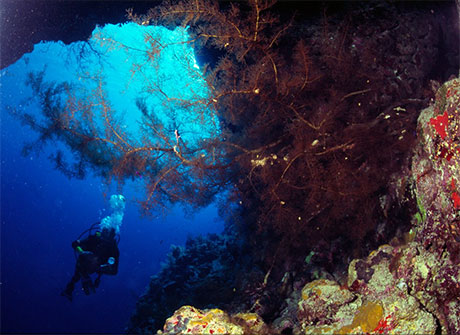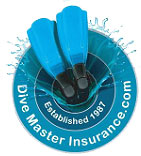Fastrack PADI Open Water Diver Course:
A Diver's Experience
29 August 2018
We sent one of the SCUBA Travel team on a Fast Track PADI course. Here's his report on the advantages of this versus other courses. Find out what to expect and what you need to know before starting the course.

The Fastrack Experience • Cold Water Diving • Course Tips • Choosing a Dive Centre with which to do the Course • Comments • Comments
The Fastrack Experience
We went with Regal Holidays to Sharm el Sheikh on a Fastrack PADI Open Water Diver course. The advantage of the Fastrack course is that your learning period is only 3 days at the dive centre; and, if you are on week's holiday, you get 3 days standard diving, providing you pass the Open Water Diver certification. The disadvantage is you have to study the background and theoretical work before you go. You must complete the Knowledge Review questions at the end of each of 5 chapters in the PADI Dive Manual. Your holiday also costs more because you have to pay for the extra 3 days diving package, but the opinion in our group was that it was well worth getting some real dives in after the course.
The 3-day course at the dive centre comprises:
- Day 1: One half day reviewing the first 3 chapters of the manual, and checking the answers you have given for the Knowledge Review sections in the manual. You will also get kitted out with the necessary equipment (mask, fins, snorkel, wet-suit, buoyancy control device (BCD) and regulator). This is followed by a half-day in the pool, doing pool sessions 1 and 2.
- Day 2: Three more pool sessions covering the remaining closed water drills, followed by a first shore dive, which was followed by the requirement to swim 200 m, without gear or 300 m with mask fins and snorkel.
- Day 3: Three boat dives, each dive starting with the necessary exercises, which are repeats of the drills practised in the pool on days 1 and 2. Return from the boat dives, and then sit down to do the final exam - 50 multiple-choice questions covering the 5 chapters in the manual. You are allowed a maximum of 12 wrong to pass. Half our group passed the first exam, the other half took a second test (the B paper) the following day on the boat out to the dive site, and passed then.
These 3 days are hard work - much harder than the 2 dives a day you will be doing later, on the 3 day dive package, or on subsequent diving holidays.
Our course was with Emperor Divers based in the Rosetta Hotel complex at Naama Bay. Our main instructor was Mike Schouten, who was an excellent teacher: patient, and able to hold the attention of the group both above and below the water. To cope with our group of 6, Mike was helped by Ingrid, and Paul who was on a course to become a PADI Dive Instructor.
Our first dive was at Shark Bay, which was quite pleasant, although the coral has suffered considerably from too many tourists, and of course there were no sharks. From the boat we dived at White Knights and Middle Garden twice, in quick succession, to complete the required open water dives.
Having passed the Open Water Diver certification, we moved on to diving with the normal guides. Under the guidance of Andy, a relaxed Californian, on loan from Sinai Divers, we dived at Ras Caty, Far Garden, Ras Nasrani, and Middle Garden again (but taking a completely different route). The final day we ventured to the Tiran Straits and dived Jackson, Woodhouse and Thomas reefs. Those on their first week of diving were fortunate to see a reef shark on the Jackson reef dive.
These dives up to 25m deep exceed the PADI recommended limit of 18m for Open Water Divers, but thanks to Andy for a sensible attitude to the conditions and abilities of his charges. And as divers will appreciate we went from no experience, to doing some world-renowned dives.

The Open Water Diver certification is all you need for diving holidays around the world. Andy had done over 1000 dives before doing the Advanced Open Water Diver course, and then progressing onto Instructor qualifications. You can become a SCUBA diver in 3 days with some preparation, so if you have always wanted to try diving, take a week's holiday and give it a go.
Cold Water Diving
Be warned that diving safely requires experience, and diving with a guide in clear, warmish, water is very different from 2 inexperienced divers, deep, in cold dark water, with poor visibility, and possibly a strong current, all of which you might encounter on a dive in, say, British waters. So if you live in a cool climate and continue diving after your holiday, join a club or make sure you go with someone with experience, until you have acquired reasonable experience of your own.
Course Tips
Course Tip: Before you go, do make sure you understand how to use the Recreational Dive Planner to calculate:
- How long you can stay down at a particular depth
- What pressure group you would be in when you return to the surface
- How long you need to stay on the surface before doing another dive to a particular depth and bottom time. There are about 5 questions, which require use of the Dive Planner, in the final exam.
Some Key Items of knowledge:
- The Golden Rule is breathe normally and don't hold your breath
- Maximum ascent rate 18 m/min
- Decompression sickness = bubbles in the blood = joint pains, paralysis, numbness
- Nitrogen Narcosis = confusion, irrational behaviour - You must know the difference between Decompression Sickness and Narcosis.
- Make sure you know the hand signals for:
- Something is wrong
- OK
- Stop
- Up
- Down
- Help or distress (at the surface)
Choosing a Dive Centre with which to do the Course
Contact several dive centres directly before booking a course. Make sure you know what the cost of the course includes: will there be any extras for equipment rental, course materials, boat trips and such like. Although cost shouldn't be your main criteria when choosing a dive centre. Choose a centre you feel comfortable with and have confidence in their training.The ratings and reviews on our web pages may help you pick a good company.
Have Fun
Enjoy learning to dive and let us know how you got on.
Comments
"You might want to do a Try Dive at you local dive centre first - This is normally quite cheap £15-20 max and (with Aberdeen Watersports) lasts over 2 hours and gives a really good idea of diving. As an instructor I've seen a few people struggle with basic skills because they're just not confident with the kit (although thought they would be) and the Fastrack will only serve to put these people off diving as they are very unlikely to make the grade when it comes to open water dives 3 and 4 - if they get that far!
Doing the course in the UK, we have a people who take 3 or 4 full weekends to complete the course. Bad experiences or panic situations can happen easily in water when learning to dive and this requires some 1 to 1 with Divemaster, AI or the Instructor to help them get past the problem/fear. In a 3 day course there is simply no time to dedicate to people who are having trouble!"
David Barclay, PADI MSDT Instructor
I would like to congratulate all the staff at Dive Northampton for helping me gain my PADI open water. Special thanks to my divemaster Pete, who was very patient with me. I can't wait to try my skills out in Egypt"
Steve Vanni
Recommended Books for Beginners
- The Complete Diver: The History, Science and Practice of Scuba Diving
by Dr Alex Brylske, 2012 - A comprehensive guide to recreational scuba diving.
Available from UK
- The Diving Manual
- Circle Books, Paperback, 164 pages, (2002).
One from the British Sub-Aqua Club. Aimed at those interested in taking up diving, and written with the forthcoming European Diver Training Standards in mind, besides supporting divers following the BSAC system this generic diving manual will also be useful to divers following other training systems.
Available from UK
- USA)



